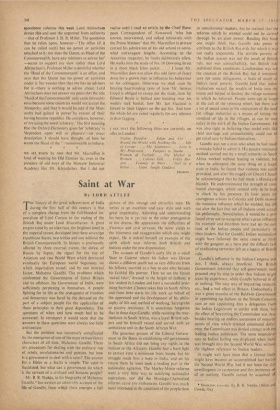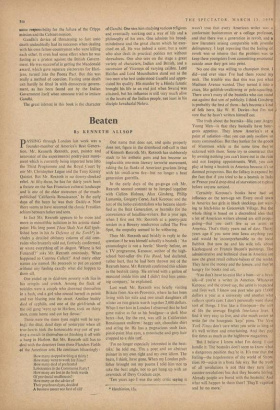Saint at War
By LORD ATTLEE TllE history of the great subcontinent of India during the first half of this century is that of a complete change from the full-blooded im- perialism of Lord Curzon to the ending of the British Raj under Lord Mountbatten. A great empire ruled by an alien race, the brightest jewel in the imperial crown, developed into three sovereign republican States, two within and one without the British Commonwealth. Its history is profoundly affected by three external events, the defeat of • Russia by Japan, the signal for the rise of Asianism and two World Wars which destroyed eventually the European world hegemony on which imperialism rested; and by one internal factor, Mahatma Gandhi. The problems which confronted the Governments of Great Britain and its offshoot, the Government of India, were sufficiently perplexing in themselves. A people fighting for its life as the protagonist of freedom and democracy was faced by the demand on the part of a subject people for the application of those principles to their great dependency. The questions of when and how much had to be answered. In retrospect it would seem that the answers to these questions were always too little and too late.
But the problem was immensely complicated by the emergence of one of the most extraordinary characters of all time, Mahatma Gandhi. There are precedents for dealing with the ordinary run of rebels, revolutionaries and patriots, but how is a government to deal with a saint? The answer for a Hitler or a Stalin is simple. The saint is liquidated, but what can a government do which is the servant of a civilised and humane people?
Mr. B. R. Nanda, in his biography of Mahatma Gandhi,* has written an admirable account of the life of Gandhi, from which there emerges a full picture of this strange and attractive man. He writes in an excellent and easy style and with great impartiality. Admiring and understanding his hero, he is yet fair to the other protagonists in the drama. He appreciates the difficulties of Viceroys and civil servants. He never yields to the bitterness and exaggeration which one might expect. He is indeed himself an example of the spirit which now informs both British and Indians under the new dispensation.
The account of Gandhi's early life in a small State in Gujerat where his father was Diwan shows a diffident youth not so very different from his fellows, married as a boy to one who .became his faithful life partner. Then we see the future 'naked fakir,' dressed in the height of fashion, a law student in London and later a successful prac- tising barrister. Chance takes him to South Africa and from here starts his- life work on behalf of the oppressed and the development of his philo- sophy of life and method of working, Satyagraha or passive resistance. It is sometimes forgotten that in those days Gandhi, while resisting the reac- tiorfaries in South Africa, was a loyal British sub- ject and he himself raised and served with an ambulance unit in the South African War.
The generous gesture of the Liberal Govern- ment to the Boers in establishing self-government in South Africa did not bring any rights to the Indians or the Africans. Gandhi had a hard fight to extract even a minimum from Smuts, but his struggle made him a hero in India, and on his return there he soon took a. leading part in the nationalist agitation. The M orley-M into reforms went a very little way to satisfying nationalist aspirations, nor did the Montagu-Chelmsford reforms cause any enthusiasm. Gandhi was much more interested in the condition of the people than
in constitutional matters, but he realised that the reforms which he wanted could not be carried -through by an alien power. Reading this book one might think that Gandhi was prone to attribute to the British Raj evils for which it was not really responsible. The terrible poverty of the Indian masses was not the result of British rule, nor was untouchability. but British rule stabilised these conditions. Landlordism was not the creation of the British Raj. but it remained. 'save for some mitigations, a basis of much of India's rural poverty. Gandhi held that indus- trialisation sucked the wealth of India into the towns and helped to destroy the village economy • in which he believed. People were apt to laugh at the cult of the spinning wheel, but there was a lot of sound sense in his conception of the need for village industries as a means of raising the standard of life in the villages, as can be seen today in the work of the Indian Government. He was also right in believing that social evils like child marriage and untouchability could not be got rid of save by Indians themselves.
Gandhi was not a man who when he had made a mistake failed to admit it. His passive resistance method carried out by a small minority in South Africa worked without leading to violence, hot when he attempted the same thing on a larger scale in India, he found that violence was easily provoked, and after the tragedy of Chauri Chaura he acknowledged that he had made a Himalayan blunder. He underestimated the strength of com- munal cleavages, which seemed only to be kept in check by his presence. In later years his courageous actions in Calcutta. and Delhi showed the immense influence which he wielded, but did not alter the fact that not all Indians could accept his philosophy. Never,theless, it would be a pro, found error not to recognise what a great influence his example and doctrines have had on the out- look of the Indian people and particularly on their leaders. But for Gandhi, Indian nationalisal might have followed the same course as Irish, with the gangster as a hero and the difficult 414 of eradicating terrorism left as a legacy of British rule.
Gandhi's influence in the Indian Congress wa not, I think, always beneficial. The British Government believed that self-government must proceed step by step in order that Indians m;ght learn by experience, while Gandhi believed in •all or nothing. The easy way Of boycotting councils, etc., had a bad effect in Britain. Undoubtedly il was a great mistake of the Baldwin Government in appointing no Indians to the Simon Commis- sion or not appointing first a delegation front the Indian Legislature to confer with them, but the effect of boycotting the Commission was t hat, besides hearing an endless succession of minority points of view which stressed communal differ- ence, the Commission was denied contact with the leading Indian politicians. The same insensitive- ness to Indian feeling was displayed when Indi:1 was brought into the Second World War without the slightest reference to Indian leaders.
It might well have been that a United India might have become an accomplished fact before
the Second World War had it not been for this unwillingness to co-operate and this insistence on all or nothing. Gandhi cannot be acquitted of • MAHA I MA cin.Notit. By 13, K. Nanda. (Allen and Unwin, 35s.) some responsibility for the failure of the Cripps mission and the Cabinet mission.
Gandhi's device of threatening to fast unto death undoubtedly had its successes when dealing with his own fellow-countrymen who were killing each other. It even had some effect when he was fasting as a protest against the British Govern- ment. He was successful in getting the Macdonald award, which gave separate electorates for Hari- jans, turned into the Poona Pact. But this was really a method of coercion. Fasting unto death can hardly be fitted in with democratic govern- ment, as has been found out by the Indian Government itself when someone tried to imitate Gandhi.
The great interest in this book is the character of Gandhi. One sees him studying various religions and eventually working out a way of life and a philosophy of his own. One admires his broad- mindedness and the great charm which he exer- cised on all. He was indeed a saint, but a saint who also dealt in practical politics not without shrewdness. One also sees on the stage a great variety of characters, Indian and British, and a succession of Viceroys of varying calibre. Lord Halifax and Lord Mountbatten stand out as the two men who best understood Gandhi and appre- ciated his quality. His murder by a Hindu fanatic brought his life to an end just when Swaraj was attained, but his influence is-still very much alive in the hearts of the Indian people, not least in his disciple Jawaharlal Nehru.



















































 Previous page
Previous page